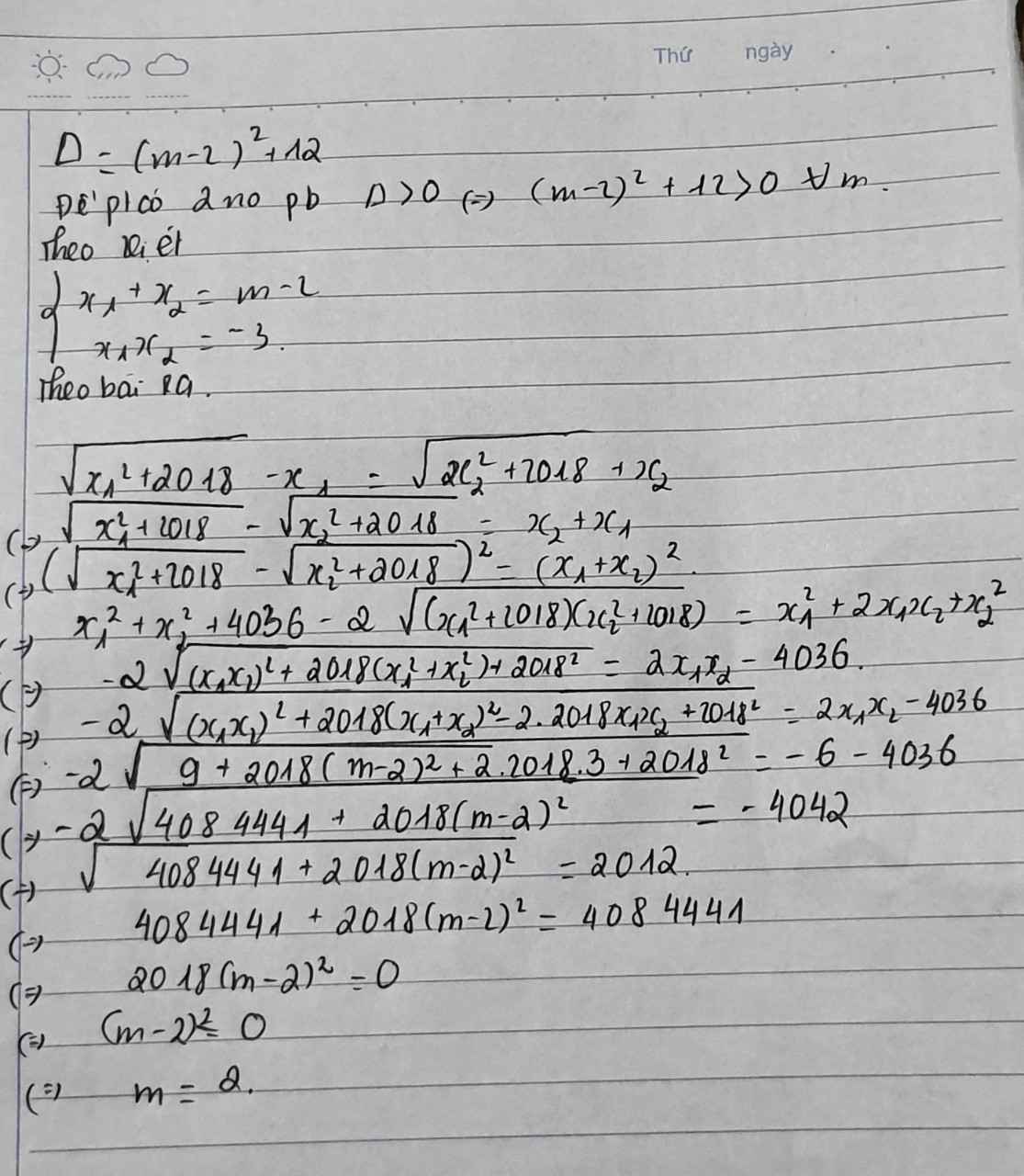Hãy nhập câu hỏi của bạn vào đây, nếu là tài khoản VIP, bạn sẽ được ưu tiên trả lời.

a. thay m=-4 vào (1) ta có:
\(x^2-5x-6=0\)
Δ=b\(^2\)-4ac= (-5)\(^2\) - 4.1.(-6)= 25 + 24= 49 > 0
\(\sqrt{\Delta}=\sqrt{49}=7\)
x\(_1\)=\(\dfrac{-b+\sqrt{\Delta}}{2a}=\dfrac{5+7}{2}\)=6
x\(_2\)=\(\dfrac{-b-\sqrt{\Delta}}{2a}=\dfrac{5-7}{2}\)=-1
vậy khi x=-4 thì pt đã cho có 2 nghiệm x\(_1\)=6; x\(_2\)=-1

a: Khi m = -4 thì:
\(x^2-5x+\left(-4\right)-2=0\)
\(\Leftrightarrow x^2-5x-6=0\)
\(\Delta=\left(-5\right)^2-5\cdot1\cdot\left(-6\right)=49\Rightarrow\sqrt{\Delta}=\sqrt{49}=7>0\)
Pt có 2 nghiệm phân biệt:
\(x_1=\dfrac{5+7}{2}=6;x_2=\dfrac{5-7}{2}=-1\)

\(a+b+c=1-2\left(m+3\right)+2m+5=0\)
\(\Rightarrow\) phương trình luôn có 2 nghiệm: \(\left\{{}\begin{matrix}x_1=1\\x_2=2m+5\end{matrix}\right.\)
Để 2 nghiệm của pt thỏa mãn yêu cầu của đề bài \(\Rightarrow x_2>0\Rightarrow2m+5>0\Rightarrow m>\dfrac{-5}{2}\)
\(\dfrac{1}{\sqrt{x_1}}+\dfrac{1}{\sqrt{x_2}}=\dfrac{4}{3}\Rightarrow\dfrac{1}{\sqrt{1}}+\dfrac{1}{\sqrt{2m+5}}=\dfrac{4}{3}\)
\(\Leftrightarrow\dfrac{1}{\sqrt{2m+5}}=\dfrac{1}{3}\Rightarrow2m+5=9\Rightarrow m=2\)

Đề là \(\sqrt{x_1^2+1}\sqrt{x_1^2+1}\)hay là \(\sqrt{x_1^2+1}\sqrt{x_2^2+1}\)
làm theo đề là \(\sqrt{x_1^2+1}\sqrt{x_2^2+1}\)
ta có để PT \(x^2-3x+m=0\)có 2 nghiệm phân biệt
=>\(\Delta=\left(-3\right)^2-4m>0< =>9>4m< =>m< \frac{9}{4}\)
theo Vi-ét
=>\(\hept{\begin{cases}x_1+x_2=3\\x_1.x_2=m\end{cases}}\)(1)
Ta có:
\(\sqrt{x_1^2+1}\sqrt{x_2^2+1}=3\sqrt{3}< =>\left(x_1^2+1\right)\left(x_2^2+1\right)=\left(3\sqrt{3}\right)^2=27\)
\(=>\left(x_1x_2\right)^2+x_2^2+x_1^2+1=27< =>x_1^2x_2^2+\left(x_1+x_2\right)^2-2x_1x_2=26\)
thay (1) vào :\(m^2+9-2m=26< =>m^2-2m-17=0< =>\orbr{\begin{cases}m=1+3\sqrt{2}\\m=1-3\sqrt{2}\end{cases}}\)
Mà \(m< \frac{9}{4}=>m=1-3\sqrt{2}\)

Lời giải:
Để pt có 2 nghiệm dương phân biệt thì:
\(\left\{\begin{matrix} \Delta=25-4(m-2)>0\\ S=5>0\\ P=m-2>0\end{matrix}\right.\Leftrightarrow 2< m< \frac{33}{4}\)
Khi đó:
\(2\left(\frac{1}{\sqrt{x_1}}+\frac{1}{\sqrt{x_2}}\right)=3\Leftrightarrow 4(\frac{1}{x_1}+\frac{1}{x_2}+\frac{2}{\sqrt{x_1x_2}})=9\)
\(\Leftrightarrow 4\left(\frac{5}{m-2}+\frac{2}{\sqrt{m-2}}\right)=9\)
\(\Leftrightarrow 4(5t^2+2t)=9\) với $t=\frac{1}{\sqrt{m-2}}$
$\Rightarrow t=\frac{1}{2}$
$\Leftrightarrow m=6$ (thỏa)

Để pt có 2 nghiệm dương phân biệt thì:
\(\left\{{}\begin{matrix}\Delta=25-4\left(m-2\right)>0\\P=5>0\\S=m-2>0\end{matrix}\right.\)
\(\Leftrightarrow\left\{{}\begin{matrix}m< 8,25\\5>0\\m>2\end{matrix}\right.\)
\(\Leftrightarrow2< m< 8,25\)
Theo vi-et thì ta có: \(\left\{{}\begin{matrix}x_1+x_2=5\\x_1x_2=m-2\end{matrix}\right.\)
Theo đề bài ta có:
\(2\left(\dfrac{1}{\sqrt{x_1}}+\dfrac{1}{\sqrt{x_2}}\right)=3\)
\(\Leftrightarrow4\left(\dfrac{1}{x_1}+\dfrac{2}{\sqrt{x_1x_2}}+\dfrac{1}{x_2}\right)=9\)
\(\Leftrightarrow\dfrac{x_1+x_2}{x_1x_2}+\dfrac{2}{\sqrt{x_1x_2}}=\dfrac{9}{4}\)
\(\Leftrightarrow\dfrac{5}{m-2}+\dfrac{2}{\sqrt{m-2}}=\dfrac{9}{4}\)
Đặt \(\dfrac{1}{\sqrt{m-2}}=a>0\) thì ta có
\(5a^2+2a-2,25=0\)
\(\Leftrightarrow\left[{}\begin{matrix}a=-0,9\left(l\right)\\a=0,5\end{matrix}\right.\)
\(\Rightarrow\dfrac{1}{\sqrt{m-2}}=0,5=\dfrac{1}{2}\)
\(\Leftrightarrow m-2=4\)
\(\Leftrightarrow m=6\)